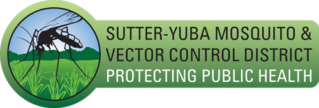Public Service Announcement
Friday, August 18, 2023


Sutter County Public Health has confirmed three human cases of West Nile Virus (WNV) in Sutter County this year – two with severe illnesses and one with moderate illness. We are continuing to investigate several additional suspect WNV human cases.
People infected with WNV generally fall into three categories:
• No symptoms/asymptomatic (8 in 10 people)
• Mild to moderate fever illness with fatigue and body aches (1 in 5 people)
• Severe illness with neurologic symptoms such as encephalitis or meningitis (less than 1 in 150 people).
For those who develop a severe WNV illness, symptoms may last several weeks and some symptoms may be permanent.
If you have symptoms after mosquito bites that you feel could be due to West Nile Virus such as fever, headache, body aches, nausea, vomiting and sometimes a rash, please speak with your doctor about testing for West Nile Virus. If lab tests indicate West Nile Virus, those results are reported to Public Health to conduct further investigation. Limited information is provided to Vector Control to facilitate further mosquito control through additional mosquito spraying and sampling.
The risk of West Nile virus continues to be high throughout Sutter and Yuba counties.
“We continue to find mosquitoes infected with West Nile virus in our surveillance system. The risk for human infection is high,” said Stephen Abshier, District Manager for Sutter-Yuba Mosquito & Vector Control District. “Residents can protect themselves from mosquito bites by limiting outdoor activities at dawn and dusk, wearing long sleeves and long pants and applying repellant when mosquitoes are active.”
Residents should inspect their yards for anything holding water. Regular landscape irrigation or unseasonable rains can provide mosquitoes with good breeding habitat. Simply draining or dumping water will prevent new mosquito breeding.
“The best way to prevent West Nile virus infection is to avoid mosquito bites,” said Bi-County Public Health Officer, Dr. Phuong Luu. “We want to remind everyone to stay protected by wearing long pants and long sleeves, especially at dawn and dusk when mosquito activity is high, and by using a good mosquito repellent.”
WNV is transmitted to humans and animals by the bite of an infected mosquito. Mosquitoes become infected when they feed on infected birds. Residents can reduce the risk of infection by practicing the “Three Ds”:
1. DEET – Use a proven insect repellent like DEET. Other recommended repellents include: picaradin, lemon eucalyptus oil, para-menthane-diol, IR3535 or 2-undecanone. Always use according to label instructions. DEET can be used safely on infants and children 2 months of age and older.
2. DAWN AND DUSK – Mosquitoes that transmit WNV bite in the early morning and evening. Wear proper clothing and repellent if outside during these times. Make sure that doors and windows have tight-fitting screens to keep mosquitoes out. Repair or replace screens with tears or holes.
3. DRAIN – Mosquitoes lay their eggs on standing water. Eliminate or drain all sources of standing water on your property, including flowerpots, old car tires, rain gutters and pet bowls. For standing water that cannot be drained such as fountains, ponds, etc., consider adding “Mosquito Dunks” or mosquito fish, which feed on mosquito larvae.
District staff are fully engaged in disease surveillance and mosquito control to reduce the adult mosquito population. Spray areas and a disease surveillance map can be viewed at the District’s website at https://sutter-yubamvcd.org/
| Contact: Sutter County Public Health Office: (530) 822-7215 1445 Veterans Memorial Circle Yuba City, CA 95993 E-mail: docsup@co.sutter.ca.us |
Contact: Stephen Abshier, Manager Office: 530-674-5456 E-mail: steve@sutter-yubamvcd.org |
2023 West Nile Virus activity update:
Sutter County: 3 human, 5 dead birds, 48 mosquito collections, and 8 sentinel chickens have tested positive for WNV as of Aug. 17, 2023.
